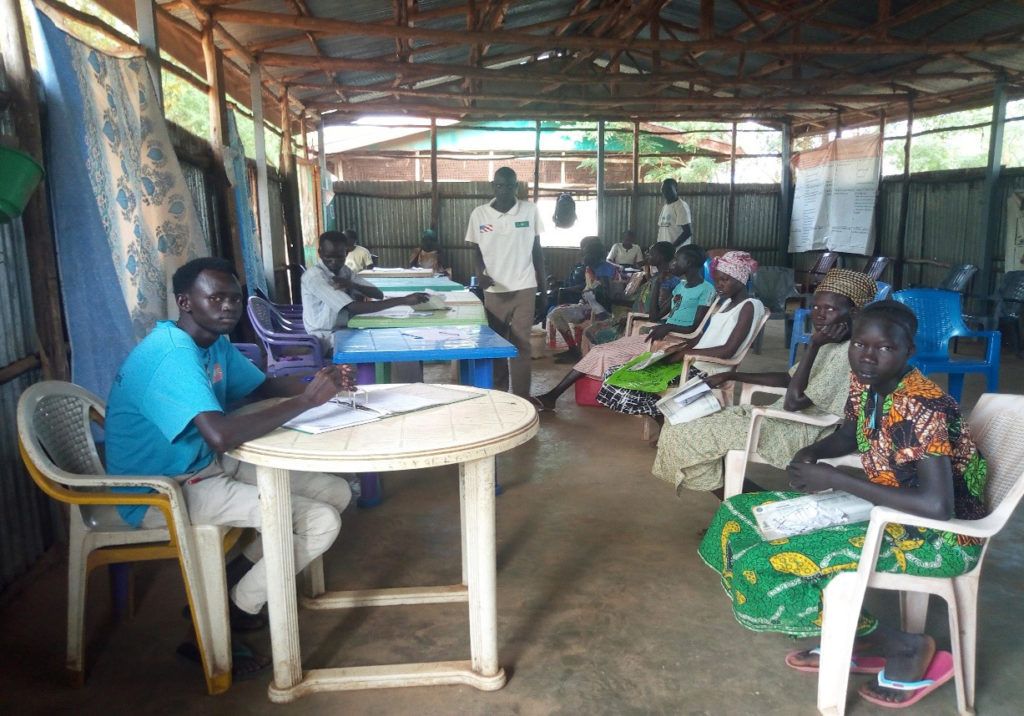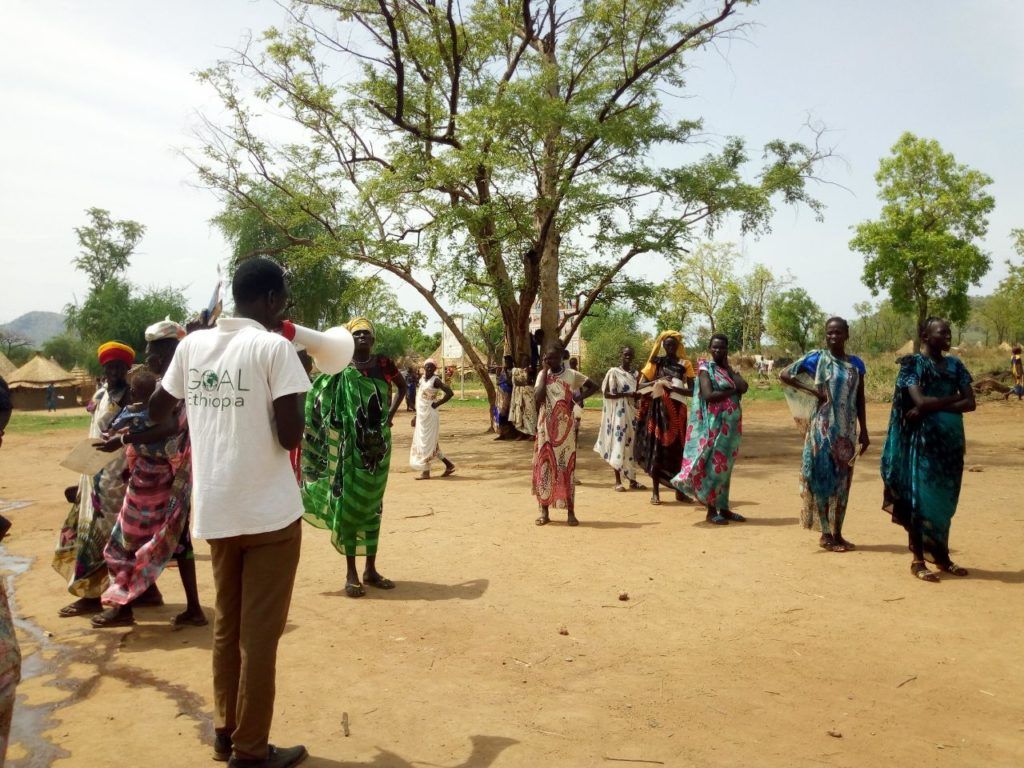 Stories
Stories
June 19, 2020 • 6 min read
Ahead of World Refugee Day, the UN says that 80% of the world’s displaced population are in countries or territories affected by acute food insecurity or malnutrition. GOAL’s nutrition team has established guidelines to account for the effect that COVID-19 could have on refugees who benefit from one of its infant nutrition programmes in Ethiopia.
The World Health Organization (WHO) has warned that the spread of the Coronavirus is accelerating in Africa, not just within capital cities but beyond. Up to now, Africa had been the continent least affected by the virus but there are now real fears that a steep rise in cases could overwhelm many parts of the continent, and in regions which already suffer from limited health infrastructure.
Refugees in particular are at an increased risk of contracting infectious diseases, including COVID-19. Harsh living environments including overcrowding, difficulties in maintaining hygiene and sanitation, and limited access to health care, increases this vulnerability.
Nidack recently fled South Sudan with her 2-year-old and 14-month-old baby.
The family are now safe in Ethiopia, receiving support from GOAL’s infant nutrition programme.#WorldRefugeeDay pic.twitter.com/KXe4xDjHOx
— GOAL Global (@GOAL_Global) June 19, 2020
Ethiopia is one of the largest refugee hosting countries in Africa, with over 750,000 registered refugees spread across eight locations. The Gambella region, in the west of the country, is one the largest, with around 41% of the total refuge population living across a number of camps. Out of this group, women and children make up 88% of the population.

South Sudanese refugees at GOAL’s nutrition programme in Tierkidi refugee camp, Gambella, Ethiopia.
Since 2014, GOAL Ethiopia has supported refugees at two camps in Kule and Tierkidi in the Gambella region. They provide life-saving and life-sustaining services as part of a wider package of preventative and curative nutrition interventions.
GOAL’s innovative MAMI programme
In 2016, GOAL became the first International NGO to trial a new innovative approach to help combat infant malnutrition. The ‘Management of At-Risk Mothers and Infants’ (MAMI) programme specifically targets infants from birth up to six months of age . It was established by GOAL in response to the large number of vulnerable mothers and infant refugees who were at risk of malnutrition after fleeing war-torn South Sudan.
Infants under six months of age are considered a neglected demographic in many low- and middle-income countries. Historically, there have been assumptions that all women could and should exclusively breastfeed infants until their baby reaches 6 months. However, the UN estimates that only around 40% of the global population of babies within this age group are exclusively breastfeed, and that approximately 8.5 million infants are suffering from acute malnutrition.

MAMI-MUAC tape design: Enumerated (top) for use with trained health workers and non-enumerated (bottom) for use in the community.
MAMI, unlike many other public health programmes, brings together both a preventative and curative approach to infant malnutrition. The programme is focused on early case identification, using amongst other markers, specially designed reversible MAMI-MUAC (mid-upper arm circumference) tapes. One side is used for small infants and the other for older children and mothers. With a focus on community-based support, including establishing/re-establishing and promoting/supporting breastfeeding, MAMI provides tailored counselling support to mothers/care-givers of nutritionally at-risk infants.
The MAMI programme and COVID-19
While much of the world’s COVID-19 response is focused on diverting resources towards containment, GOAL’s global nutrition advisor, Hatty Barthorp, says it is equally important to prevent the collapse of existing life-saving and life-sustaining services, especially where vulnerable refugee groups are involved.
‘‘Even in the face of COVID-19, it is critical to continue to provide MAMI services to prevent and manage these at-risk infants (including support for their mothers), as they are extremely vulnerable,’’ she says.

Additional handwashing facilities have been installed at the MAMI programme in Gambella.
A lack of global guidance specific to MAMI in the context of COVID-19 was also something that GOAL has addressed.
‘‘At present, there is global guidance available for other nutrition programmes, such as ‘Child Wasting’ in the context of COVID-19, but nothing for the at-risk mothers and infants under six months (MAMI)’’ says Barthorp.
This gap has prompted the GOAL team to update and establish their own guidelines for MAMI programming in the context of COVID-19. It is expected that global guidance will follow.
GOAL’s guidelines for MAMI programming (adaptation to COVID-19) also consider available international guidelines (which are nutrition and refugee context-specific).
The guidance includes:
- Restricting or suspending all community-group support sessions in line with government restrictions.
- Intensifying public awareness around protection, promotion and support for optimal feeding for all breastfed and non-breastfed infants.
- Agreeing and communicating protocols around social distancing and wider infection prevention-control (IPC) measures.
- Simplifying case identification, enrolment criteria, counselling and treatment protocols.
- Case identification: Use of Community Outreach Agents (COAs) to cascade messages in the community regarding self-identification and referral of at-risk infants using non-enumerated MAMI-MUAC tapes.
- Enrolment criteria: Most enrolment protocols can be maintained using social distancing. Those that require closer contact i.e. MUAC, weight and vital signs assessments, can be maintained using adequate PPE.
- Counselling and treatment: Decentralize follow-up services from facility-based care to the community, with home-based counselling and support for existing cases.
- Intensify pre-positioning (with a minimum buffer stock of 2 months) of essential commodities for MAMI services.
- Include provision of hygiene kits for children and pregnant and lactating women (PLWs) with IPC messaging.
- Through use of the Family MAMI-MUAC approach, intensify efforts to strengthen the capacity of mothers/caregivers to detect and monitor their baby’s nutritional status. Full adherence to the International Code of Marketing of Breast-milk Substitutes and IYCF-E guidelines.
- Adapt the MEAL plan and digital data tools if necessary
The MAMI guidelines will serve as an important reference document for Gambella refugee camp staff and serve as the best available resource.
Other MAMI programme adaptations
‘‘As our staff in Gambella prepare for this adaptive MAMI response, they have trained 112 Community Outreach Agents (COAs) and around 1,289 mothers and caregivers to assess their infant’s nutritional status using non-enumerated, colour-coded MAMI-MUAC tapes,’’ adds Barthorp.

Social distancing being enforced at the MAMI nutrition programme in Gambella.
During the pandemic, the MAMI programme will also use real-time monitoring and surveillance systems with the use of mobile technology to inform response options – a key recommendation for global nutrition programming in the context of COVID-19.
GOAL believes the new MAMI guidance in the context of COVID-19 will help other organisations implementing MAMI in different contexts. Countries with a high burden of malnutrition among infants under six months, such as countries in the southern region of Asia, can also refer to these guidelines and adapt as per their local context.
The MAMI approach was initially developed by the Emergency Nutrition Network (ENN) along with the London School of Hygiene and Tropical Medicine (LSHTM) with support from a number of organisations involved in the MAMI Special Interest Group. GOAL’s guidance adaptations will feature in the journal World Nutrition at the end of June 2020.
For more information relating to GOAL’s guidance adaptations for MAMI in the context of COVID-19, contact Hatty Barhorp, Global Nutrition Advisor, GOAL, Email: hbarthorp@goal.ie or Ritu Rana, Nutrition Research Advisor (MAMI), Email: rrana@goal.ie


